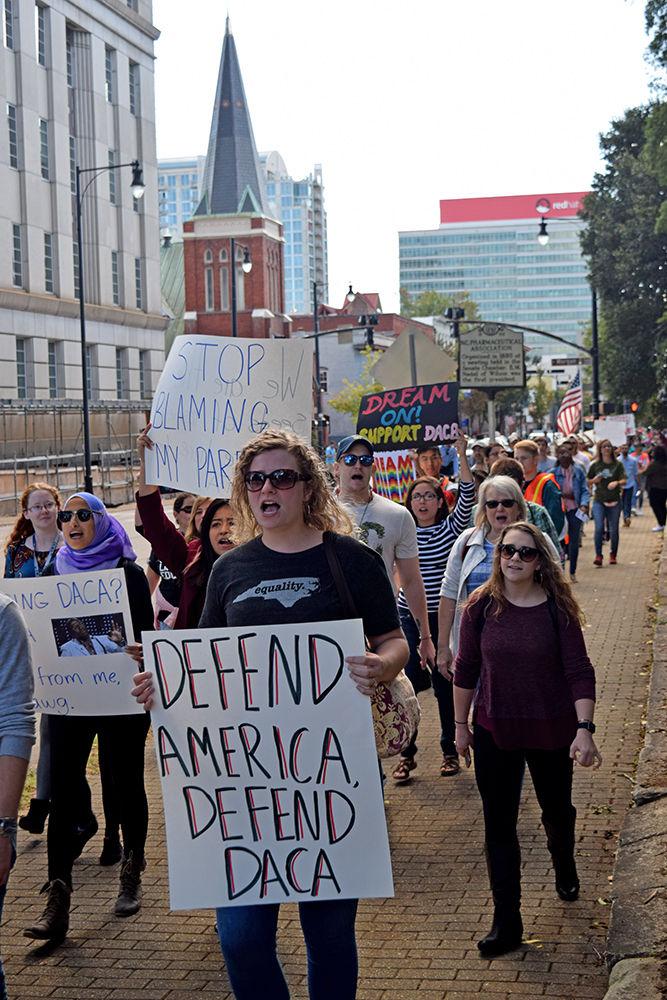Jill Anderson, who holds a Ph.D. in English with a specialization in Mexican-American literature from the University of Texas, sat in a Mexico City restaurant and overheard English being spoken. Upon recognizing the English as similar to her own, she approached a young waiter who was speaking to someone else and found out that he was originally from Chicago.
That waiter had been one of hundreds of thousands who had arrived illegally in the United States as a child, part of a demographic commonly known as “Dreamers,” who had been deported to Mexico or were essentially forced to migrate back. Since those encounters early on, Anderson sought after a postdoctoral fellowship at the National Autonomous University of Mexico where she was able to do research in documenting the experiences of duality of young people that had been deported to Mexico or were returned migrants.
Anderson spoke at NC State on April 11 in an event titled “Deportation Diasporas: Removed to a Country that was Never Home” that was sponsored by the Department of Sociology and Anthropology.
Her work, which culminated in a now out of print book titled “Los Otros Dreamers,” which translated to “The Other Dreamers,” tells the in-depth bicultural and bilingual stories of the Dreamers of the other side, some of whom have criminal histories with minor or major infractions.
Anderson’s book states that these individuals matter, too, and that they are disproving the incorrect assumption that a criminal conviction constitutes an identity.
“We’re bringing together all of these stories,” Anderson said. “The reason for the inclusion of deported youth with former gang activity and criminal activity is to challenge what people think a Dreamer is.”
Anderson is the co-founder of Otros Dreams en Acción (ODA), translating to Other Dreams in Action, a nonprofit that has facilitated and documented the literary and artistic development of Dreamers in Mexico. It is part of a network of organizations that responds to the new Latinx diaspora caused by deportations from America.
A hyper-militarized border and a perilous immigration system has sent young people with much potential across the border to find a living in a foreign nation to be dropped off at one of 12 “repatriation” points in the country after being deported.
ODA is one of the organizations that welcomed deportees in Mexico City to give them resources to help them as they are received by their birth country and are faced with starting new lives.
“Under Trump, the number of deportations haven’t gone up but the interior removals have,” Anderson said. “Those are the numbers of people who are deported crossing the border and are deported after living here after a very long time.”
ODA has also assisted the Dreamers with applying for visas to enter the United States again.
“In the book, Luis talks about how he was deported, found a payphone, called his mom back in the United States, and asked what to do,” Anderson said. “His mom told him to go to Guerrero, and he asks, ‘Well, where’s Guerrero?’”
Anderson detailed how a handful of the people she has worked with have faced robbery, extortion and kidnapping from cartels concentrated along the regions near the United States border.
Poch@ House, a space for returnees and deportees in Mexico that Anderson helps operate, works to help them re-establish themselves. Poch@, coming from the word “pocho/a,” a derogatory term for Mexicans who mix Spanish and English, is reclaimed and used for good in this place.
Genesis Torres, a third-year studying psychology, commented on the importance of student activism related to the work of ODA.
“It’s an injustice, and we’re called as fellow humans to look after one another in this way,” Torres said. “As students, as ‘estudiantes,’ we need to get involved and take action in our communities to care for immigrants and fight against local legislation that can harm them, undocumented or not.”
Anderson sighed after speaking for a prolonged time on the topic of deportation diaspora and challenges of trauma and mental health issues that are associated with deportation and forced migration.
“Poch@ House and ODA want to create programs that will create opportunities to become English teachers or be part of the tourism industry,” Anderson said. “We’re trying to work with alternatives to exploitative jobs the Dreamers encounter.”













